I'll admit, there is a selfish element at play here. Bourdain was, and still is, a massive influence on me. I have Kitchen Confidential on my bookshelf, and have watched just about every episode of Parts Unknown. His death hits me particularly hard, and I'd be lying if I said, upon learning of his suicide, I didn't immediately think to myself that silliest of thoughts: "He had it so well, why would he do this?" But, of course, I never knew the man. Never met him, nor anyone close to him, and I certainly couldn't speak to his lifelong struggles, regardless of how candid he was in front of the camera or via his writing.
But I do know his demons. Which is why the thought that his fame, money and influence could somehow wash away entirely that darkest of notions is so utterly ridiculous. Anyone who has suffered suicidal thoughts can tell you that no amount of perceived success and happiness can silence the "voices" in your head.
Roughly three years ago, I wrote an open letter on suicide to college students. It was just after my own alma mater, Appalachian State, suffered the loss of three of its students. And it is worth noting that preceding these tragic deaths was the very publicly discussed suicide of Robin Williams. Indeed, it has been found that celebrity deaths as a result of suicide have a direct effect on increases in suicidal ideations in the community.
In other words, now more than ever, it is important to take mental health seriously. And after this news has been fed through the media machine and dumped out on the other side, it will still be important to take mental health seriously. There should never be a time where we are not openly discussing, without shame, the (again) pervasive issue of suicide. Because it is just that: pervasive. It may spike, and ebb, and flow, but it doesn't cease. I wish I could tell you that there is some magical cure for suicide just around the corner, waiting to be discovered and eventually gifted unto the ennui-ridden populace. But there isn't.
And yet, everything is not hopeless. I won't tell you that things are particularly great, because they're not and never will be. But life is not futile. And while I don't like to interject myself into these sorts of discussions, in this case, I think it's necessary. I have suicidal thoughts. Nothing that has been even close to manifesting itself for quite some time, but there all the same, lingering in the back of my mind. Unidentifiable shapes at the edge of a dark forest, threatening to step out into the light.
I live with that every day, and people far stronger than I am live with it even closer. Their thoughts don't exist in the back of their minds, instead taking up residence a little closer to reality and certainly too close for comfort. But people persist, and live, and do so without the notion that these demons will ever truly go away. Because there will always be triggers. Little things that seemingly come out of nowhere and threaten to swallow you whole.
But with enough serious discussion of mental health, and the very real effects it can have on our society, we can help keep some of these triggers at bay. Listen to people, and never downplay someone's struggles because of who they are or where they are in life. Open up to those who would listen, and never think for a second, that because of who you are, or where you come from, or how you've acted, means you are unworthy of being heard. Your mental health is important, and what you are feeling is very real and always worth discussing.
Like I said, there is no ideal solution to this, no perfect little word or saying that will make it all go away. It's really not that kind of problem. But we can, and will, continue to live in spite of it.
If you are having thoughts of suicide, call the National Suicide Prevention Lifeline at 1-800-273-8255 (TALK) or go to SpeakingOfSuicide.com/resources for a list of additional resources.
RIP Kate Spade 1962-2018
RIP Anthony Bourdain 1956-2018
RIP Anthony Bourdain 1956-2018






